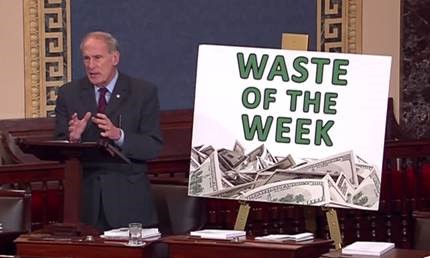WASHINGTON, DC – Senator Dan Coats (R-Ind.), the chairman of the Joint Economic Committee, today spoke on the Senate floor and highlighted two examples of wasteful spending by the National Science Foundation (NSF) that cost taxpayers over $2 million.
“When Congress created the NSF, the agency’s goals were to promote progress in science, help secure our national defense and advance national health, prosperity and welfare,” said Coats. “I am not here today to undermine the validity of the NSF. There’s no question that research funded by the NSF has led to remarkable discoveries and that the majority of NSF research is worthwhile. However, thanks to the work started by my former colleague, Senator Tom Coburn, it has become clear that NSF has funded some research that truly falls in the category of a waste of taxpayer dollars – either because the research has questionable benefit, or because it is research that should more appropriately be conducted by the private sector.”
The first project Coats highlighted was a $171,000 NSF grant to study how monkeys gamble. Researchers taught monkeys to gamble to see if they could develop a “hot hand” mentality. Instead of earning money, the monkeys were rewarded with food. The study found that monkeys tried to get as much food as possible from their “gambling game.”
“I am sure that there are some who say that this is new information,” said Coats. “For one, I didn’t know monkeys could gamble. Regardless, my bet is that taxpayers agree with me that there are much more pressing issues that deserve federal funding.”
The second example Coats highlighted was a nearly $2 million NSF grant to Cornell University for a study on popular landmark photos. The researchers claimed they would search the Internet’s 40 billion page collection of websites to make photo archives available to social scientists for later research. In reality, the researchers examined photos that had been publicly uploaded to a popular photo-sharing site, Flickr, and then determined some of the top-photographed sites in the world.
“Now, we must ask ourselves: was this basic Internet research really worth $2 million?” said Coats. “The researchers stated that their work could help with online travel guides and improve social media sites’ ability to ‘guess’ where a photo was taken. Helping improve online travel guides and social media geo-location services is not exactly part of the NSF’s original mission.” Coats said that in order to ensure that the NSF regains its status as the “gold standard” in science, there must be more transparency on how taxpayer dollars are being used by the NSF.
Coats submitted an amendment to the Commerce, Justice, Science, and Related Agencies Appropriations Act – legislation currently under consideration in the Senate – that would require the NSF to publish the documents submitted by grant recipients outlining what the research will entail. Right now, the NSF only provides short summaries of the proposals that are awarded funds, but these summaries are very limited in describing the research being undertaken.
“We cannot appropriately fix the problem without all of the non-proprietary information and without a clear understanding of the intent of the research grants awarded by the NSF,” said Coats. “Taxpayers have a right to know how their money is being spent.”
To watch Senator Coats’ remarks, click here.
 WYRZ.org 98.9 WYRZ – The Voice of Hendricks County
WYRZ.org 98.9 WYRZ – The Voice of Hendricks County





